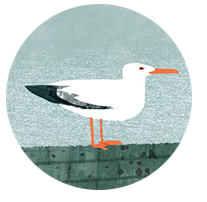
INSIDE: Kitchen of Manus Sweeney’s cottage, with fireplace and two doors to two bedrooms.
OUTSIDE: The street around the house with 12 cottages. Against the gable wall are a curragh, fishing nets, lobster pots, farming equipment, ancient gramophone.
The action takes place on the island of Inishkeen in June. The inhabitants are leaving for good – all except Manus Sweeney and his family. Most of the islanders are already in the boats. The last few hurry down past Sweeney’s house on their way down to the harbour. They are wearing their best clothes.
MANUS: A man that never saw a town bigger than Ballybeg.
![]()
MANUS: Fifty years ago there were two hundred people on this island; our own school, our own church, our own doctor. No one ever wanted…They belong here and they’ll never belong anywhere else! Never! D’you know where they’re going to? I do. I know. To back rooms in the back streets of London and Manchester and Glasgow. I’ve lived in them. I know. And that’s where they’ll die, long before their time – Eamonn and Con and Big Anthony and Nora Dan that never had a coat on her back until this day. And cocky Bosco with his mouth organ – this day week if he’s lucky he’ll be another Irish Paddy slaving his guts out in a tunnel all day and crawling home to a bothy at night.
![]()
PETER: My God, it’s heavenly. Look, Shane, everywhere you turn, look at the view; you can see for a hundred miles. And the clarity. Look – there’s a river where we camped the night before last and the lake where the lorry picked us up and the old railway station and the plantation where the men were cutting the spruce. And the sea, Shane, look at the sea.
![]()
JOE: You’re king of the whole island now, father… King of Inishkeen. King of nothing.
![]()
SARAH: That he’s down there in the boathouse at the far slip, your Philly, my husband. That they’re stripped naked. That he’s doing for the tramp what he couldn’t do for me. That’s what I’m trying to say. And that if you’re the great King of Inishkeen, you’ll kill them both – that’s what I’m saying.
![]()
JOE: To the Ballybeg hospital.
MANUS: He’s lying there in Ballybeg?
MANUS: Joe – you know Joe – he was fussing about missing the Derry bus
JOE: They’ll be dry before I get to Derry.
BOSCO: Get the knickers off, all you Glasgow women! The Inishkeen stallions is coming!
MARY: I’m not leading you into Manchester like an early Christian pilgrim!
BRIAN FRIEL: We see most facets of Irish life, love, hate, loneliness, tensions in the life of the gentle island.¹
![]()
BRIAN FRIEL: I would like to write a play that would capture the peculiar spiritual, and indeed material, flux that this country is in at the moment. This has got to be done, for me anyway, and I think it has got to be done at a local, parochial level.²
![]()
BRIAN FRIEL: The title The Gentle Island is satirical and it’s a direct translation of the word.³
BRIAN FRIEL: One of the big problems is that there are two societies, and I feel very strongly about this. There is the Dublin society in the Dublin environs, and then there is the rest. This is not quite the same as purely urban-rural… you have two distinct societies… A much closer link with rural roots is necessary4.
![]()
BRIAN FRIEL: The end of a kind of life that fashioned a people.5
JOE: Two strangers from Dublin were here.
![]()
PETER: If you think teaching’s tiring, spend a morning cutting turf.
![]()
SHANE: The simple, upright, hardworking peasant holding on manfully to the real values in life, sustained by a thousand-year-old culture, preserving for my people a really worthwhile inheritance.
BRIAN FRIEL: Violence in Irish life may be suggested in my play but it is not specifically reflected in the story.6
SARAH: You’ve had enough with Philly, engineer. He robbed you, Manus. He robbed me. Shoot him! Shoot him!
SHANE: Acute unease on paradise island. War thought imminent. All men over seventeen report for military service.
EXTRACT: He was a young airman from Hamburg and he crashed into that stump of a hill over there. It was a night in the summer of ’42 and his plane was burned to ashes… The fishermen found him about fifty yards from the plane. They made a grave and laid him to rest.
MANUS: That’s a comfortable chair. Sit down on it, I’ll tell you about that chair. It came out of a German airplane that crashed into the side of that hill… We buried him in the old cemetery alongside the British sailors that were washed in.
✭ The Gentle Island, Book Jacket, courtesy of The Gallery Press
✭ Postcards of Donegal, Courtesy of Donegal County Museum
✭ Poster and images of Performance courtesy of Corn Mill Theatre
✭ The Gentle Island (1971) by Brian Friel (London: Davis-Poynter) 1973
✭ Brian Friel, The Saucer of Larks (1959) in Brian Friel: Selected Short Stories, (Co. Meath: Gallery Books), 1979
✭ ¹Brian Friel’s Other Island, Aodhan Madden 1971 in Delaney, Paul (ed.) Brian Friel in Conversation. Ann Arbor: The University of Michigan Press 2000, p.110
✭ 2&6Brian Friel to Fergus Linehan in 1970 quoted in Brian Friel’s Other Island, Aodhan Madden 1971 in Delaney, Paul (ed.) Brian Friel in Conversation. Ann Arbor: The University of Michigan Press 2000, p.109
✭ 3&4Kathleen Mavourneen, Here Comes Brian Friel, Desmond Rushe (1970) in Delaney, Paul (ed.) Brian Friel in Conversation. Ann Arbor: The University of Michigan Press 2000, p.82
✭5 National Library of Ireland Collection List No. 73 BRIAN FRIEL PAPERS, MS 37,063/1 note dated 28 September 1970.

An Action of the County Donegal Heritage Plan
© 2024 | Donegal County Council. All rights reserved.